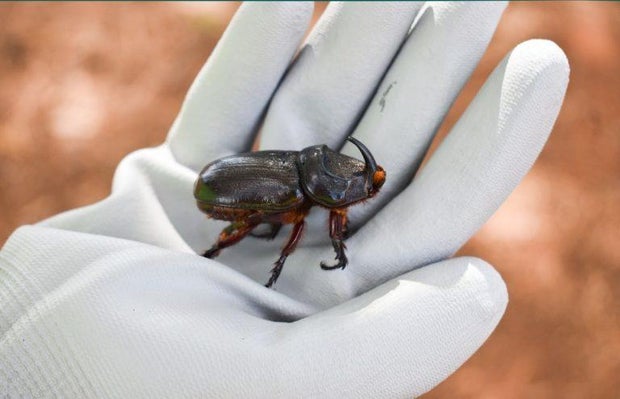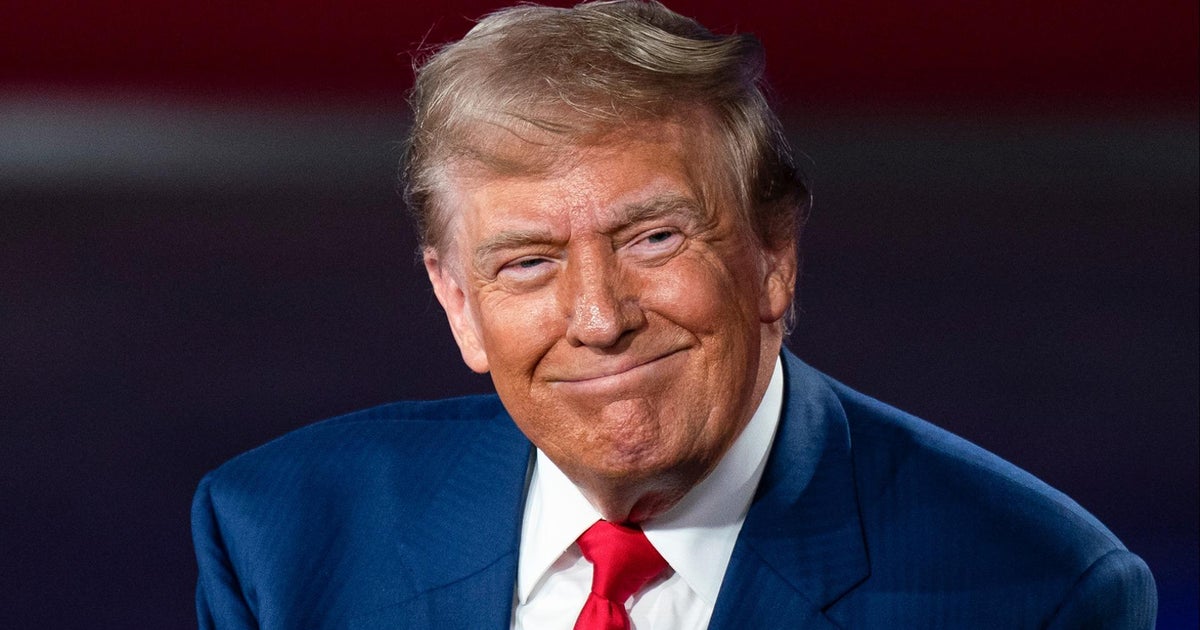CBS News
Hawaii races to stop spread of tree-killing rhinoceros beetles, invasive species that can fly 2 miles and lay 140 eggs

Hawaii is ramping up its efforts to stop the spread of coconut rhinoceros beetles, an invasive species that has expanded its presence drastically since first being detected in the state a decade ago.
According to the state’s Invasive Species Council, the beetles — which are native to Africa, China and Southeast Asia — are about two inches long with a C-shaped body. They are nocturnal and can fly up to two miles when looking for a food source, and female beetles lay 50-140 eggs in their lifetime, which is typically four to nine months.
First found in Hawaii in 2013 at the Joint Base Pearl Harbor-Hickam, the invasive species spread across the state last year and has been detected multiple times in recent months, officials say. Coconut rhinoceros beetles do not bite but may carry disease since they live in dirt and mulch, experts say.
According to the Hawaii Invasive Species Council, the beetles can kill coconut trees, palms and other tropical crops like kalo and banana, once they bore into them, which ultimately “jeopardizes the economy, entire ecosystem, agriculture and food security.”
Hawaii Department of Natural Resources
Earlier this month, Honolulu removed an infested coconut tree at Kaiaka Bay Beach Park in an effort to control the invasive species, Hawaii News Now reported.
“It’s another sad day for us. We don’t like removing trees, especially trees like the coconut. Not only is it the ‘Tree of Life’, culturally very, very important to the Hawaiian people, so today is another sad day, and there’ll be more sad days,” said Roxanne Adams, the administrator of the city’s Department of Parks and Recreation Division of Urban Forestry.
On the North Shore, about 80 trees are slated for removal because of the beetle, the station reported.
“The unfortunate truth of this situation right now is it’s going to get worse before it gets better,” said Nate Serota of the Department of Parks and Recreation. “We’re going to have to start removing more and more of these palms, really out of concern for public safety.”
More than 100 traps have been set up around the state and regularly monitored, and earlier this month, the state designated Oahu as infested by the beetles. Under a new rule, landscaping materials such as compost, wood chips, mulch, and palms taller than four feet are not allowed to be shipped from Oahu.
Hawaii board bolsters pest control powers
The Hawaii Board of Agriculture has approved rule changes to help control the spread of invasive species following about a 20-month delay.
The holdup caused a public outcry because the rule changes are intended to help the Agriculture Department stem the movement of commodities infested by pests, including coconut rhinoceros beetles.
Once finalized, the rules will prohibit the movement of infested materials like soils and compost between islands and increase inspection requirements. They also will include specific examples of invasive species to help guide the department and industry.
Neither proponents nor opponents of the rule changes seemed fully satisfied following a Tuesday board meeting. Agriculture industry representatives called them confusing, while some proponents said they don’t go far enough.
The board members, who approved the changes unanimously, agreed that invasive species need to be better addressed, and quickly.
“This is about an all-hands-on-deck approach to managing, preventing – and hopefully eradicating – the ongoing cycle of invasive species,” Big Island board member Dianne Ley said.
That sentiment echoed messages from federal invasive species experts touring Oahu this week to research the effects of invasive species on island communities. They will produce a report to advise the U.S. government how it can help Hawaii and island territories, as well as associated Micronesian nations.
Local advocates of taking action against invasive species addressed the federal advisers Monday, pointing out the gaps in Hawaii’s response and regulations addressing the problem.
The agriculture board’s action on Tuesday was a significant step following 20 months of waiting since board chairperson Sharon Hurd pulled the proposed rule changes in the face of industry concerns.
Coconut rhinoceros beetles were detected for the first time on islands statewide in subsequent months, while little fire ants caused serious concern on Oahu’s windward coast.
Compost, soil and green waste, as well as the nursery trade, have been been blamed for the movement of those pests.
The board had approved interim rules in the meantime aimed at restricting the movement of host material for the beetles and ants.
On Tuesday, Hurd voted in favor of the permanent changes.
The newly approved rules have buoyed the hopes of environmental advocates, including Joseph Watt of the KEY Project, a Kualoa-Heeia community organization.
“I’m in strong support of these amendments; we need much stronger regulatory oversight of the movement of these materials,” Watt said.
Hawaii Floriculture and Nursery Association President Eric Tanouye on Tuesday said his membership would be more open to the rule changes as long as the agriculture department provides better guidance on how to comply. About 11 months ago, Tanouye said the revised rules would “kill agriculture.”
The rule changes, while welcome, should be the benchmark for further work to increase the department’s regulatory powers, said Stephanie Easley of the Coordinating Group on Alien Pest Species, which is affiliated with the University of Hawaii.
Additional rule changes are needed to prohibit the sale of infested plant materials, Easley told the board on Tuesday.
“Islands are a bellwether for invasive species impacts”
Questions were raised about how the department would implement the rules, considering its history of struggling to find staff and funding. The signing of Act 231 this year put about $10 million aside for the department to bolster its invasive species work and biosecurity, after lawmakers pressured the DOA to do a better job.
Ten pest control positions were created with that funding, and Plant Quarantine Branch Manager Jonathan Ho said they are in the process of being filled.
On Tuesday, board members requested that staff give monthly updates on progress in pest control, particularly as the agency works through finalizing the rules and implementing the programs under Act 231.
The rule changes will go before the Small Business Regulatory Review Board before reaching the governor’s office for a final sign-off.
Federal government officials and invasive species experts, meanwhile, are finalizing a report that will be delivered to the National Invasive Species Council, which oversees the expansion of pest management efforts nationwide and across several national agencies.
The three-day meeting in Honolulu of the federally appointed Invasive Species Advisory Committee, which includes two members from Hawaii, concludes Wednesday.
On Monday, Hawaii officials and invasive species workers and academics shared their views on Hawaii’s invasive species problems.
“We need resources, we need people and we need capacity,” said Chelsea Arnott, Hawaii Invasive Species Council program supervisor.
Representatives of the U.S. departments of Agriculture, Interior, Defense, Homeland Security and Health and Human Services were among the attendees.
The committee’s draft recommendations cover seven major areas, such as expanding federal support for island-based invasive species efforts, increasing island-specific research and infrastructure needs and addressing shortcomings in rapid response to species detections.
“Ultimately, islands are a bellwether for invasive species impacts, both nationally and globally, and are indicative of what continental communities and ecosystems may experience in the future,” the draft report states. “Accordingly, science, systems, and solutions developed to address invasive species on islands may be widely applicable across the United States.”
CBS News
Designers push for Black hairstyle emojis

Watch CBS News
Be the first to know
Get browser notifications for breaking news, live events, and exclusive reporting.
CBS News
Harris campaign trying to highlight negatives about Trump as campaign winds down

Watch CBS News
Be the first to know
Get browser notifications for breaking news, live events, and exclusive reporting.
CBS News
As Trump claims U.K. Labour Party election meddling, CBS News investigates foreign agent campaign donations

The Trump campaign filed a formal legal complaint this week with the Federal Election Commission over what the campaign calls “blatant foreign interference in the 2024 Presidential Election in the form of apparent illegal foreign national contributions made by the Labour Party of the United Kingdom, and accepted by Harris for President.”
That claim remains unsubstantiated, and has been denied by both the U.K. Labour Party and its leader, British Prime Minister Keir Starmer. But lobbying firms and individual lobbyists formally registered as foreign agents of governments around the world — all with varying interests and including some autocratic regimes such as Saudi Arabia, Qatar, and the United Arab Emirates — are donating significant amounts of money to both Republican and Democratic parties and candidates in this election cycle, a CBS News analysis has found.
It is not uncommon, and not illegal, for registered foreign agents and lobbyists to finance political campaigns. Any legal permanent U.S. resident can donate to a political candidate or campaign, subject to limits imposed by the FEC.
Over $33.5 million in individual political contributions came from registered foreign agents and lobbyists during the 2020 election cycle, according to analysis conducted by the OpenSecrets organization.
But campaign finance experts say the volume of donations reviewed by CBS News and the way they’re steered into American politics to serve foreign interests highlights potential loopholes in existing U.S. campaign finance laws. CBS News has reached out to all lawmakers, and donors referenced in this report for comment.
The donations and firms behind them highlighted below are likely to be just the tip of the iceberg in terms of the scale of political contributions being made by registered foreign agents, and experts say it’s not just the flow of money that matters, but the conversations that take place between the entities involved.
“What I’ve seen in over 15 years of analyzing U.S. Foreign Agents Registration Act [FARA] filings is that there is a very, very strong correlation between whom these foreign agents are contacting and whom they’re giving money to, you know, which campaigns they’re giving money to,” Ben Freeman, the director of the Quincy Institute’s Democratizing Foreign Policy program, told CBS News.
“If they’re contacting a congressional office, on behalf of a foreign power, there’s a very good chance that they or somebody at their firm are also making campaign contributions to them,” Freeman said.
Below are some of those firms:
Brownstein Hyatt Farber Shreck
Brownstein Hyatt Farber Schreck made $17 million in revenue for the third quarter of 2024 alone, according to Politico, citing the firm’s most recent disclosure of revenue, making the company one of the most lucrative lobbyists in Washington.
OpenSecrets’ most recent analysis shows the firm has taken nearly $1.3 million in total fees from foreign governments this year, with its biggest client being Saudi Arabia.
When donations from individuals related to their firm, including relatives of employees, as well as the firm’s own political action committee, are taken into account, Brownstein has donated a total of $2,369,712 this year to political candidates across the country.
Around 56% of that money has gone to GOP candidates and causes, while about 42% has gone to groups and candidates affiliated with the Democrats, OpenSecrets data shows.
FARA filings reviewed by CBS News show the company is currently representing both the Saudi Ministry of Foreign Affairs and NEOM company, an investment group controlled by the Saudi government.
The principal signatory on the firm’s foreign agent filings is Nadeam A. Elshami, a former chief of staff to ex House Speaker Nancy Pelosi. Federal Election Commission records show Elshami has made multiple donations to senior Democratic figures this year.
Elshami donated $2,500 in July to the Jobs, Education and Family First PAC, a political action committee affiliated with Democratic House Minority Leader Hakeem Jeffries. This PAC is a “Leadership PAC,” which is a fundraising tool often established “in order to support candidates for various federal and nonfederal offices,” according to the FEC.
Records show Elshami also donated $500 in June to the re-election campaign of Rep. Adam Smith, the top ranking Democrat on the House Armed Services Committee — the body responsible for funding and oversight of the U.S. Department of Defense and the United States Armed Forces.
Smith was part of a congressional delegation that met with Saudi Crown Prince Mohammed bin Salman in Jeddah in March of this year. In August, the Biden administration lifted a ban on selling offensive weapons to Saudi Arabia, reversing a three-year-old policy that had been in place to pressure the kingdom to wind down the Yemen war.
Smith told CBS News in a phone interview on Wednesday that he had not even been aware of the donation but said that it was “a bit of a stretch to take someone who is a U.S. citizen with 20 years of Hill experience, dozens of clients and say that he was acting on behalf of Saudi Arabia.”
“If it’s proven that Saudi Arabia or any other country for that matter is organizing an effort to get people to give money, then that’s bundling and foreign countries can’t do that,” he added.
Elshami also donated $1,000 to the campaign of Rep. Pete Aguilar, chair of the House Democratic Caucus, responsible for electing Democratic leadership in the House, as well as $5,000 to the Democratic Congressional Campaign Committee, an official fundraising arm for House Democrats across the country.
“These aren’t the biggest contributions that members of Congress are going to be receiving in terms of donations, but $1,000, $5,000, $10,000, especially in the smaller downstream races, that goes a significant way, especially in the House of Representatives,” Casey Michel, author of the book “Foreign Agents: How American Lobbyists and Lawmakers Threaten Democracy Around the World,” told CBS News.
Ballard Partners
Lobbying firm Ballard Partners has received around $375,000 from foreign governments this year. OpenSecrets analysis shows the Democratic Republic of the Congo has been its most lucrative client, but FARA filings show the firm has lobbied for countries including Japan, Liberia and Guatemala. The firm recently opened a new office in Saudi Arabia.
Republican megadonor Brian Ballard is the chief signatory on these foreign agent filings
This year alone, Ballard has personally donated around $250,000 to the Republican National Committee, and another $250,000 to the Trump 47 Committee PAC.
While Ballard has prolifically donated to Republican causes, he did contribute $3,300 to Sen. Chris Coons, of Delaware, in March. The following month, Coons — a top Democrat on the powerful Senate Foreign Relations Committee and a close ally of President Biden’s — introduced a renewal of the African Growth and Opportunity Act, or AGOA. One of Ballard’s clients, the Democratic Republic of Congo, is a beneficiary of this legislation, which grants sub-Saharan African countries duty-free access to the U.S. market.
A spokesperson for Coons told CBS News in a statement that “AGOA has had broad, bipartisan support for nearly 25 years, and Senator Coons is one of many in Congress who have routinely supported AGOA during his tenure in the Senate.”
“Senator Coons believes that Americans should have confidence their legislators are not unduly influenced by foreign nations, and he would consider any FARA reform that came before the Senate,” the spokesperson said.
Akin Gump Strauss Hauer & Feld LLP
The lobbying group Akin Gump Strauss Hauer & Feld has earned $5.5 million dollars from foreign government clients this year.
The United Arab Emirates is behind a sizable chunk of those fees, having paid the company $1.9 million dollars for its lobbying services on the Gulf state’s behalf, according to OpenSecrets. The company has also received $1.5 million from Saudi Arabia, OpenSecrets records show.
Political contributions from individuals and their family members related to the firm, as well as the firm’s own PAC donations, have totalled about $2.7 million for 2024 so far, according to an OpenSecrets analysis.
The donations have been distributed on a fairly bipartisan basis. Contributions include a total of $121,195 to the Democratic Senatorial Committee and $100,715 to the Kamala Harris campaign, and $100,625 to the National Republican Senatorial Committee.
FARA filings reviewed by CBS News show a current senior advisor for Akin Gump, Ileana Ros-Lehtinen, was lobbying on behalf of the UAE as recently as 2022.
Ros-Lehtinen is a former Florida Republican congresswoman who has made multiple donations to GOP lawmakers in this election cycle.
In February, Ros-Lehtinen made a $1,000 donation to Republican Rep. Maria Salazar, a member of the House Foreign Affairs Committee, the powerful committee with jurisdiction over bills and investigations concerning U.S. foreign affairs, as well as a $500 donation to Rep. Mario Diaz Balart, a congressman who has in the past taken a hard-line legislative stance against the Muslim Brotherhood, pushing for sanctions against the Sunni Islamist political movement. The group is fiercely opposed by the UAE.
She also donated $5,000 to Akin Gump’s own political action committee in February.
“In the U.S., by far, the most common occupation for former members of Congress is to lobby other members of Congress when they leave the House or the Senate — it’s more than 50%,” Ben Freeman of the Quincy Institute notes.
Freeman told CBS News the cumulative effect of political donations can be sizable in terms of lobbyist influence.
“Something like $500, you know, it might not look like that much if you look at just one of these contributions at a time, but these contributions don’t happen on an island. One lobbyist at the firm might make a $1,000 contribution, another one might make $2,000. The firm’s PAC might make, you know, several $1,000 contributions, too,” he said. “When you start adding up all the contributions from all the lobbyists and the firm itself, you start to get to some serious numbers on some of these politicians — you know, tens of thousands and even hundreds of thousands.”
BGR Group
The firm BGR Group has earned $288,621 this year according to OpenSecrets. Most of that money has come from its top client, Qatar.
Individuals and PACs associated with the lobbying firm have, per OpenSecrets records, spent nearly $2 million cumulatively in campaign contributions in this election cycle.
Of that money, around $29,532 in total contributions from individuals and from the firm itself has been donated specifically to Republican Sen. Roger Wicker, the ranking member of the Senate Armed Services Committee, during 2024. It makes Wicker one of the largest individual beneficiaries of BGR contributions this year, per OpenSecrets analysis.
The Senate Armed Services Committee is currently reviewing Qatar’s status as a major non-NATO U.S. ally, after a group of senators introduced legislation to revoke the Gulf state’s status unless it withdraws alleged financial support for terrorist groups and expels or extradites senior Hamas leadership.
Wicker voiced opposition to the bill when it was introduced in April.
“This strikes me as a step we should be very careful about,” Wicker said, according to Jewish Insider. “Qatar has been a friend in many ways and there are mutual benefits in our two countries continuing to be friends. This is a matter that governments should speak to each other about.”
In a statement, Nathan Calvert, communications director for Sen. Wicker, said “support from individuals at BGR is a direct result of long-standing friendships among fellow Mississippians that precede Senator Wicker’s time in elected office. Senator Wicker regularly meets with and considers the views of a wide variety of constituents and stakeholders regardless of their political support or lack thereof.”
FEC filings seen by CBS News also show that BGR Government Affairs CEO Bob Wood has donated more than $42,000 to the National Republican Senatorial Committee, the official fundraising arm for the GOP’s efforts to elect candidates to the U.S. Senate.
Will FARA laws change?
Recent cases involving Democratic lawmakers including former Sen. Robert Menendez of New Jersey, Rep. Henry Cuellar of Texas, and New York City Mayor Eric Adams, have exposed the potential frailties in foreign agent registry laws that could allow for foreign influence campaigns.
All three lawmakers were indicted in separate cases on charges of accepting bribes from foreign governments in exchange for official acts over the past year. Both Adams and Cuellar have pleaded not guilty to the charges and denied any wrongdoing. In July, Menendez was found guilty on all counts after being tried on charges of illegally using his influence to benefit the governments of Egypt and Qatar.
Campaign finance expert Casey Michel told CBS News that legislative efforts to reform lobbying rules seem unlikely to pass, as lawmakers are the primary beneficiaries of the existing system.
Michel noted that a whole host of legislative efforts — including a bipartisan bill called the Fighting Foreign Influence Act — have failed in Congress.
“I think the great irony in the last few years is that there have been all these bills that have been introduced, especially related to FARA and how to tighten things up, how to improve things, and none of them have passed,” Michel said. “And the reason was because the chairman of the Senate Foreign Relations Committee, who was, you know, the most powerful senator in terms of crafting American foreign policy, was Bob Menendez, who, as we now know, was working simultaneously as an agent of the Egyptian government.”
contributed to this report.









